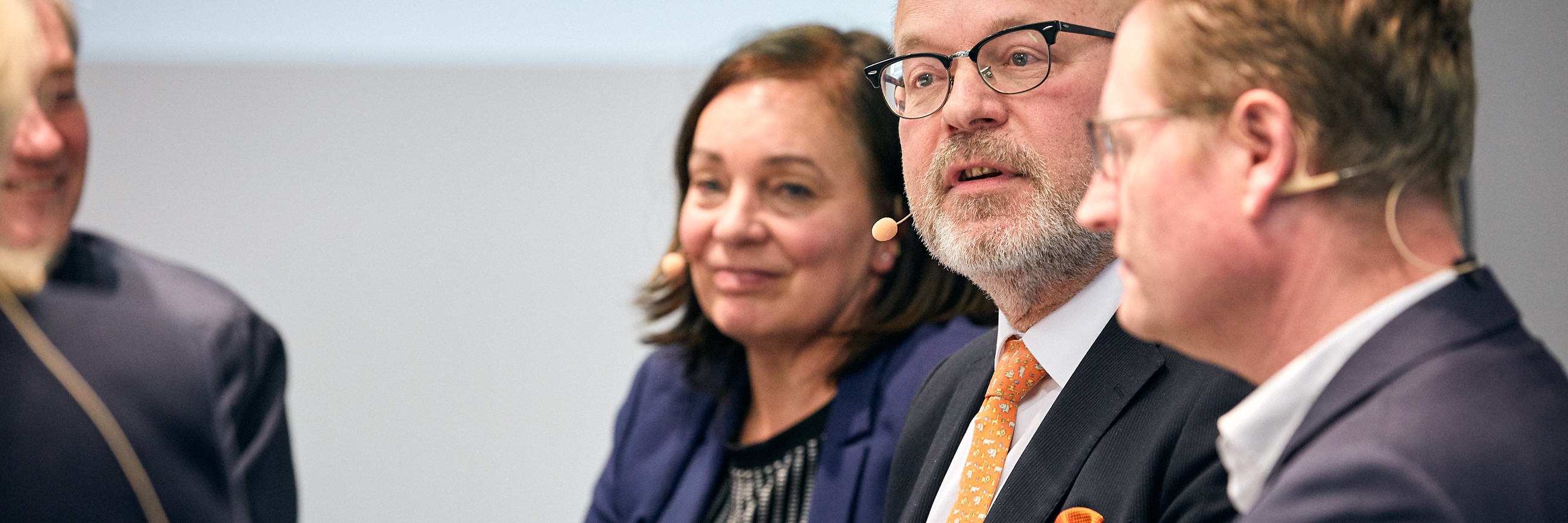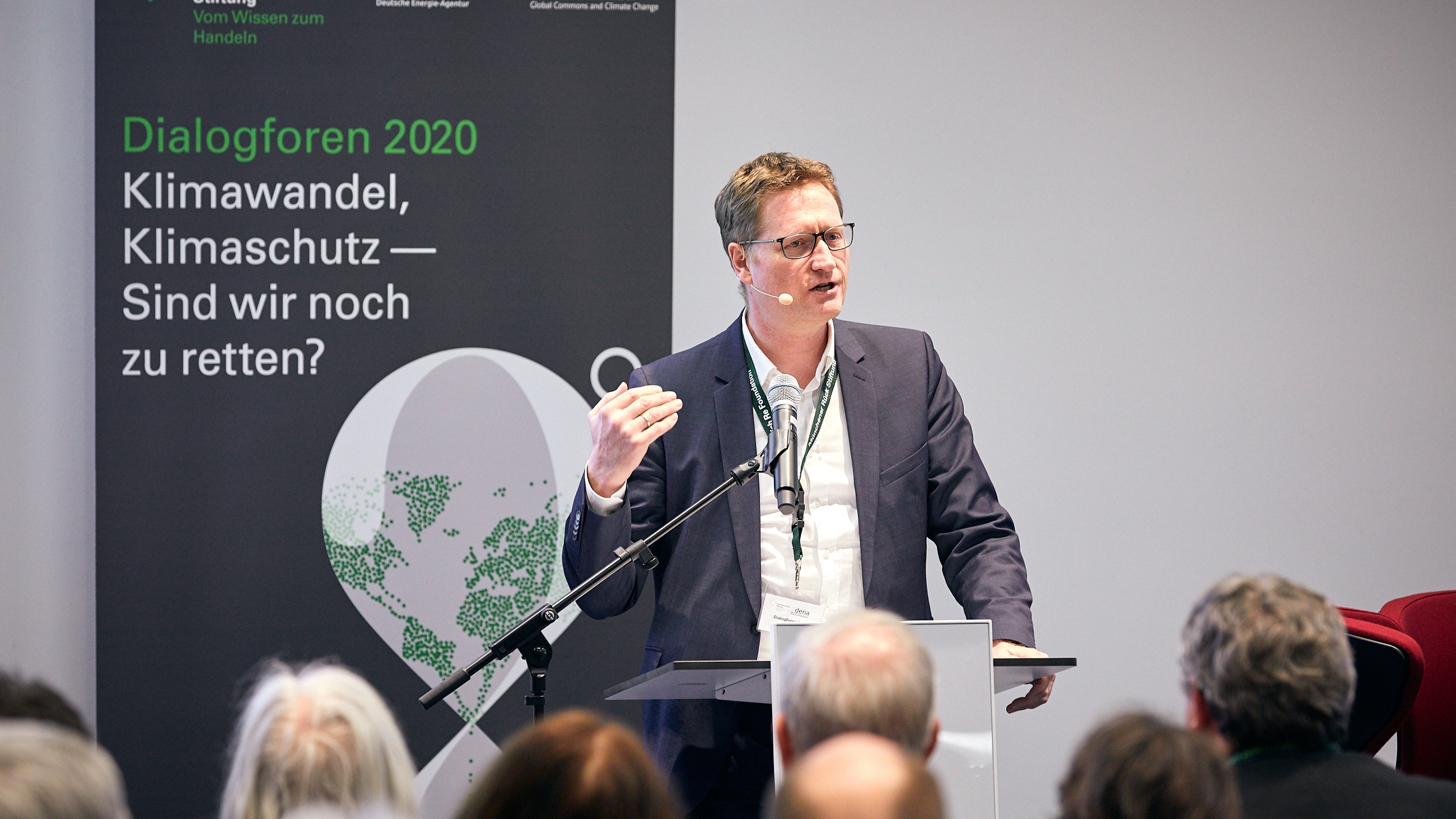
Tomorrow's mobility - emission-free travel with electricity and hydrogen?
Dialogue Forum on 18 February 2020
properties.trackTitle
properties.trackSubtitle
Without a traffic turnaround, the climate objectives of Paris cannot be achieved. This is why the German government has set itself ambitious targets for electric mobility in its climate package decided at the end of 2019. Are the measures adopted sufficient? And what happens after 2030?

Mix of all mobility types
Dr. Claus Doll, mobility expert at the Fraunhofer Institute for Systems and Innovation Research ISI, is also convinced that the mobility turnaround involves more than just turning away from fossil fuels. "Mobility is an elementary part of our culture, we must not only think of the energy issue. Much is happening at city and community level to create a more liveable environment, for example through car sharing systems. "We must not be too dogmatic and dictate to individuals how they should move. We need better and fewer vehicles, there must be a mix of all types of mobility," he demanded. This would include other options beyond e-mobility, such as the regenerative fuels hydrogen or bioethanol.
Lex Hartmann trusts technological progress, which can often develop exponentially. "We are at a tipping point in e-mobility," the managing director of ubitricity Gesellschaft für verteilte Energiesysteme is convinced. He cites several reasons for this: E-cars will soon be more economical than gasoline or diesel, the customer will have more choice of vehicles, politicians are promoting e-mobility to the best of their ability, and a new generation is growing up for which the car is no longer a status symbol. Hartmann sees a major challenge in the development of an intelligent and economical charging infrastructure. "We need about 1.5 sockets per e-vehicle," he explained the dimensions. "It's a huge task, but Germany will manage it."

"Home connection mobility" as the key to success
"There is little to be gained by simply changing the drive system; the cars must also become smaller and lighter," said Marion Jungbluth, team leader for mobility and travel at the German Central Consumer Federation. The most important thing, she said, is to give people mobility even without their own car. Her association therefore advocates a legal right to a "home connection mobility". "Just as every household has electricity, drinking water, sewage and waste disposal, it must also be connected to the mobility system.
This does not mean that the nearest bus stop has to be less than one kilometre away everywhere. In fact, it is decisive that the house connection works well, that it is easily accessible, affordable and meets the needs. "Around the clock, even on weekends." She sees a key to this in digitization, where apps are used to organize mobility on demand such as carpooling or car sharing. Then the quality of mobility offers could satisfy the demands of people in rural areas as well. Just imposing bans on people and then leaving them alone doesn't work. "You have to build up alternatives, then you can make the car more expensive, a mere discussion of abandonment is fatal," she warned.
"We don't have to reinvent the wheel, sometimes it is enough to simply look at other countries and take their experiences into account," Hartmann recommended. He sees perfectionism in Germany as a barrier on the way to more environmentally friendly mobility. Instead of wanting to make everything perfect right from the start, we should simply get started as the Netherlands, Norway or Denmark have done to help e-mobility achieve a breakthrough.

Fuel cell as an alternative to the battery
In addition to battery-powered vehicles and biofuels, the fuel cell based on hydrogen also offers a way to reduce CO2 emissions. "The crucial question is at what cost green hydrogen will be available in the future," Bonhoff made clear. He said that the topic should not be put off, otherwise the fuel cell would not come, which would not be in the consumers' interest. "We know from surveys that for many people the hydrogen concept is more convincing than pure battery operation," he made clear. Mobility expert Doll replied: "The technological challenges with hydrogen have not yet been completely solved.” He therefore believes that the technology will not be ready for the market until 2030 or 2035.
Furthermore, Doll advocates giving more room to the free play of the markets. "If you let the economy do its work, you could organize better mobility services with app-controlled groupage taxi services like Uber or Lyft, as in the US." In addition to local public transport, this would also make it possible to provide rural regions with affordable mobility services. "Letting a big bus run all day is not affordable."

The mobility turnaround is therefore much more complex than simply changing the drive type. For a far-reaching system change in the transport industry, leadership and cooperation are needed. The big question is: Are the measures adopted so far sufficient to realize the CO2 savings? "We can do it, but it is not a foregone conclusion," says Doll. The Federal Government's plan must therefore be constantly reviewed and readjusted. "There is always the possibility of disruptive changes in technologies. That's why in ten years' time we can be on the move in terms of mobility in a completely different way than we imagine today," hopes Jungbluth. "We'll make it easily," Hartmann is sure, pointing to the rapid development, for example in the costs and efficiency of solar systems, which nobody could have imagined a decade ago. "Cheap renewable energies are the game changer in traffic," says Bonhoff, adding: "It's feasible, but we all have to put our own house in order.”
*******************************************
The "Mobility of tomorrow" Dialogue Forum on 18 February 2020 was organised in Munich by the Munich Re Foundation together with the German Energy Agency (dena), Berlin. The event was moderated by Kristina Haverkamp, Managing Director of dena. The next event in the series will take place in Berlin. We will meet on 12 March to discuss "Save the climate - Innovation to avert disaster".